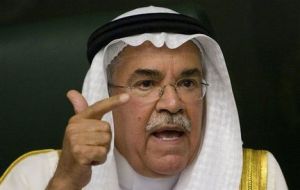MercoPress. South Atlantic News Agency
Saudis warn of another oil price spike within “two-to-three years”
 Ali al- Naimi said the price of oil will climb to $75 a barrel when demand picks up
Ali al- Naimi said the price of oil will climb to $75 a barrel when demand picks up The world could face within “two-to-three years” another oil price spike similar to that witnessed in 2008, Saudi Arabian Oil Minister Ali al-Naimi said on Monday. Al-Naimi warned a meeting of Group of Eight ministers in Rome that the high-price scenario was likely unless investments in “new capacity expansion projects are made”.
The Oil Minister from Saudi Arabia, the world's top oil exporter, made the remarks in a speech during an afternoon session at the Rome gathering titled Energy Investments for Security and Sustainable Development.
He said once the world recovers from the current economic slump, “the combination of a growing global population and the pent up yearning for prosperity in developing economies, will drive the need for significant energy supply growth in the decades ahead.”
Despite efforts to find alternative energy sources, much of it would still rely on fossil fuels, Al-Naimi said.
The two-day Rome gathering which ends Monday is bringing together representatives from the G8- the United States, Japan, Germany, France, Britain, Italy, Canada and Russia. Also attending Monday are energy officials from emerging economies such as Brazil, Mexico, China, Egypt, India, Saudi Arabia, and South Africa, among others.
Earlier Monday participants at the gathering were told by a senior International Monetary Fund official that the recent rise in oil prices signals a feeling that the sharpest period of global economic decline “is over”.
Oil prices in recent weeks have risen to around 60 dollars a barrel “reflecting a general improvement,” including that growth in China “may be picking up,” IMF First Deputy Managing Director, John Lipsky, said.
He also said that the price rise was built “on expectations that the contraction in oil demand may bottom out soon.” Lipsky urged policy makers to find ways to reduce oil price volatility and its consequences on the global economy.
“Rapid oil price changes are detrimental to both global growth and to global economic and financial stability,” he said. Policy makers should “address the principal factors underlying large oil price swings.”
The need to safeguard global energy security, also as a tool to promote worldwide economic recovery, has topped the Rome meeting's agenda, along with discussions on new clean technologies to increase energy efficiency and reduce greenhouse gas emissions. On Sunday participants heard estimates from the International Energy Agency (IEA) that global electricity consumption is expected to contract by 3.5% in 2008, the first decrease since records began after World War II.




Top Comments
Disclaimer & comment rulesCommenting for this story is now closed.
If you have a Facebook account, become a fan and comment on our Facebook Page!